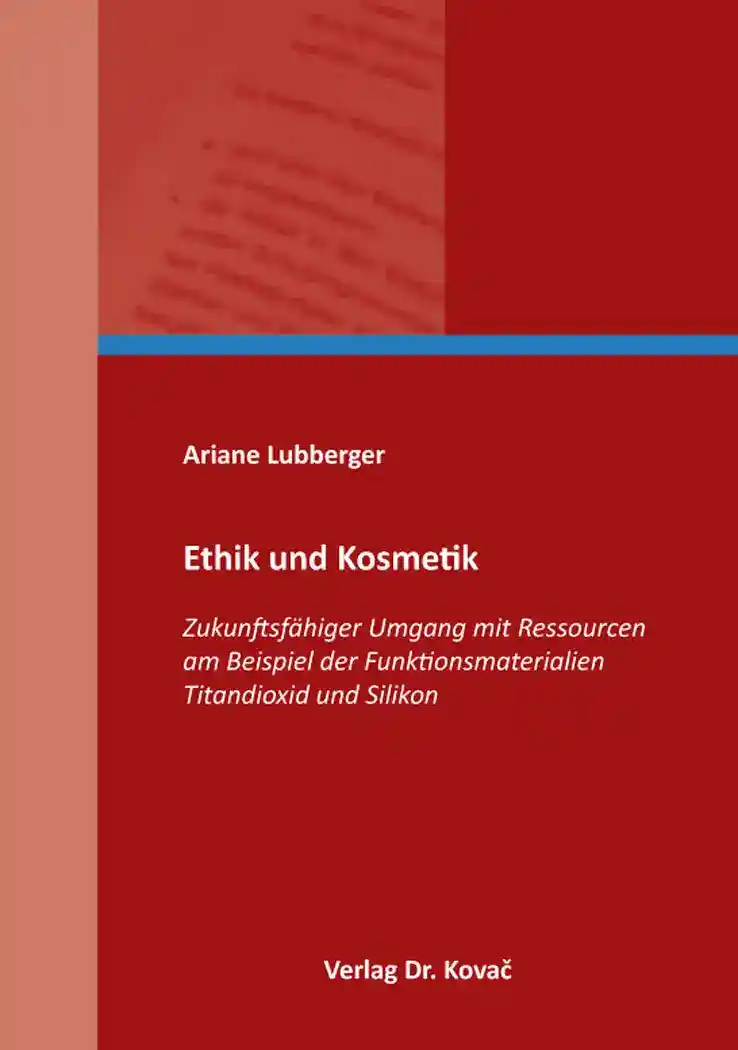Ariane LubbergerEthik und Kosmetik
Zukunftsfähiger Umgang mit Ressourcen am Beispiel der Funktionsmaterialien Titandioxid und Silikon
Ethik in Forschung und Praxis, volume 18
Hamburg 2017, 214 pages
ISBN 978-3-8300-9537-8 (print) |ISBN 978-3-339-09537-4 (eBook)
About this book deutschenglish
Everybody is in pursuit of a good life. As simply as that sounds as challenging its realization is. While one might find a big car and a wardrobe full of choices indispensable, someone else might seek a minimalistic lifestyle as an essential requirement for his or her personal happiness. Diversity in life choices and the distinct design of a good life is one of the characteristics of our time. To ensure this individuality for future generations as well, we must conserve the resources they need to live the life of their choosing. Resources like mineral oil, water or air but also health, resilience or antibiotics are the premises for modern human life and with it the pursuit of a good life.
This relationship between resources and our pursuit of a good life is the topic of this book. Fairness and sustainability are the main requirements for a good way of handling resources. At the time being the way we exploit, process, use and dispense resources is not at all sustainable. Several consumer habits and accepted customs need to be discussed and revalued in light of fairness and future living.
On moral grounds the big questions are: Which resources do future people need to live a good life? Do we have the responsibility to ensure a good lifestyle for other creatures like animals and plants too? What does this responsibility possibly mean for the standing of mankind in nature? Ideas like the Anthropocene or Sustainability discuss the power of mankind over the whereabouts of the earth and can be used as groundwork for moral evaluation.
Based on the findings of this first part of the book, moral requirements for a sustainable handling of resources are described and tested in a case study. Therefore the widely unnecessary but nonetheless beloved and heavily used items of cosmetics are chosen as an example for the inconsiderate use of resources. Especially titanium dioxide and silicones are commonly used in cosmetics without hesitation even though theirs implications on nature, health and the future are widespread. That is the reason why these substances are the perfect example for the thesis of this book: We need to include morals in the way we handle resources – otherwise future generations might never be able to live a good and happy life.
Keywords
AnthropozänAristotelesBildung für nachhaltige EntwicklungEthikGerechtigkeitGutes LebenInterdisziplinaritätKosmetikNachhaltigkeitRessourcenRessourcenstrategieSilikonStoffgeschichtenTitandioxidUmweltethikIhr Werk im Verlag Dr. Kovač

Möchten Sie Ihre wissenschaftliche Arbeit publizieren? Erfahren Sie mehr über unsere günstigen Konditionen und unseren Service für Autorinnen und Autoren.
